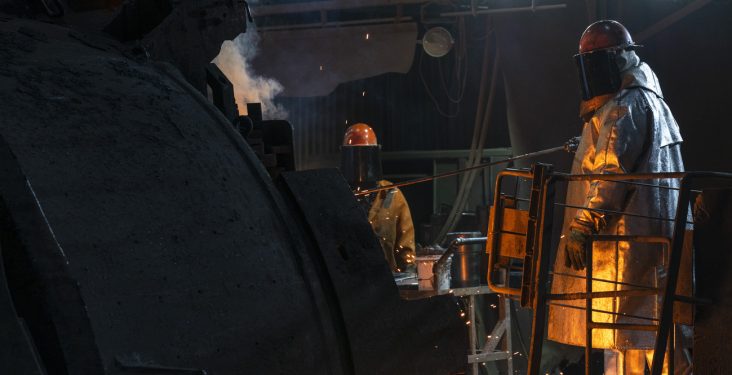U.S. Steel feeling welcome in Arkansas, CEO says
by April 6, 2022 4:14 pm 2,064 views

U.S. Steel factory workers.
Arkansas has been so welcoming to U.S. Steel that officials are being offered free bottled water and help moving to town, President and CEO David Burritt said at the Arkansas Economic Development Foundation Luncheon on Wednesday (April 6).
Burritt said an Osceola resident pulled into Senior Vice President and Chief Operating Officer Dan Brown’s driveway and offered to help as Brown was moving in. Another official said a gas station attendant told him the water he was purchasing was free when he told him he was working for U.S. Steel.
“This is a great place to do business, and it’s because of the people that you have here. … We love the culture in Osceola. They make our people feel extraordinarily welcome,” he said.
Burritt spoke at the luncheon three months after the company announced it had selected Osceola for a $3 billion steel factory expected to create 900 jobs with an average salary of more than $100,000.
The company already owns an existing steel facility in Osceola, Big River Steel. That mini-mill – the kind that is engaged in process improvement – is outperforming the best mini-mill in North America by 10 percentage points, he said.
Prior to Burritt’s remarks, Gov. Asa Hutchinson noted that Mississippi County will produce more steel than any other county in North America.
Burritt said he knows there will be a recession at some point, but that will always be the case and the company will navigate through the next one. He said his firm is working to change the feast or famine cycle that has often afflicted the steel industry. He said he is optimistic about his company, which started in 1901 and was the first to have $1 billion in sales and $1 billion in market capitalization.
“I am extraordinarily bullish about our business and about Arkansas – bullish with a capital ‘B,’” he said.
He said his company will always face challenges such as high capital and maintenance costs. Steel production leaves a large carbon footprint, but the company is working to produce more green-friendly mini-mills. A new type of steel is 75% less carbon intensive.
Also, ore from the Minnesota Iron Range will help the United States rely less on pig iron, 70% of which comes from overseas sources including Russia and Ukraine. The Minnesota sources, which still must be developed, will be a “huge game-changer,” he said.
Proceeds from the luncheon will benefit the state’s economic development efforts.
